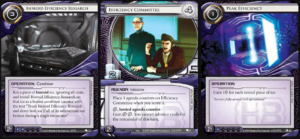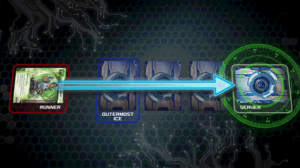Introduction
Greetings! My nick is usually Elusive on various forums, and while I do not consider myself a top player in the game I have done well enough to consider myself to have a good grasp on the game overall. I do have a tendency to play hipster-decks and have a long time love-affair with Jinteki PE and Leela Patel! My main interest is in game-design and game balance, which is the perspective I hope to bring to the table here.
This is the first in a series of six articles where I will try to summarize a lot of my thoughts on the game and its deep and various aspects, in doing so I hope to bring something interesting and useful to new and veteran players alike. My reasons for writing these articles are threefold;
First I want the game to be as good as it can be, and you will come to see what I personally consider ‘good’ to be. Second, I want the players of this game to be as good as they can be. It makes for fun and exciting games, and improving at the game is really rewarding and fun! Third I really need to structure my own thoughts on this matter, this is a reason for me to do so, and a way for me to continue improving at the game myself.

He is for sure also thinking about playing a game.
This first article will introduce a structured way of thinking about the game; in essence what skills affect the outcome of a match. I will try to as objectively as possible consider the various player factors that affects a game outcome and introduce concepts that I find useful in thinking about the game.
The second article will deal with an under discussed topic: the psychology of playing Netrunner, and what I consider to be dos and don’ts when it comes to state-of-mind. This article will also try to analyse burnout and tilt and provide some guidance on continuing to enjoy the game and to avoid the various pitfalls there can be.
The third article will deal with aspects of deck-building and deck-choice, as well as a try to classify the different types of decks there are. The purpose of this part will be to establish a general way to describe decks that suit different play-styles, guide you towards your deck of choice, and comment on some things like silver-bullets.
The fourth article will deal with how to improve as a player. Something I feel is way under discussed compared to decks, or cards or ‘the meta’. It will be using the concepts introduced earlier to identify play-errors and areas of improvement. This article in particular I hope will be helpful for newer players, as well as players who feel like they have a hard time getting better at the game.
The fifth article will deal with the difference of playing the game casually and playing in a tournament. Here we will also look in detail on what specific factors affect the outcome of a tournament and try to provide some insight in what to focus on if you are new to the tournament-scene or if you have been in the scene for a while respectively.
The sixth and final article will consist on my personal comments on the game and will be a lot more subjective than the previous pieces. I will use the concepts introduced here to delve into some of the detailed thoughts I have on how the game can improve, and to acknowledge the, in my opinion, really impressive aspects of the Netrunner design.
Now, let’s get started!
The Skills of Netrunner
What affects the outcome of a game of Netrunner? The common explanation is usually two things: skill, and luck. While accurate, this will not give us enough language to discuss strategy in the game. We need to expand on the types of skill there are.
The main goal then is to identify what makes a good player, and what that player does to be successful. To do this we need to separate the concepts of skill and luck in more detail, because on their own they do not offer much help. I will try to define a set of concepts that I find much more useful for discussing match outcomes and game design below.
Variance
Now let’s get into the concepts. First up is variance. This is a very useful concept, and does not mean the same thing as ‘randomness’. Variance means distribution around an average. Simply put, outcome is swingy. Swingyness! By its very nature Netrunner is high in this property, and it makes for exciting games.
Netrunner is a high-variance, high-skill game. This differs from chess which is a low-variance, high-skill game. In chess a better player will beat a worse player very often in a single game, In Netrunner difference in skill means less for an individual game, but due to the structure of tournament play this rarely affects the winners or indeed top-8 of a tournament.
An in-game example of this is the psi-game, this is definitely not a random game but it is high in variance. A good player usually try to minimize variance as much as possible when playing, simply to make the game more like chess and to be able to beat worse opponents more often. Less variance means strategic and tactical skill is more important. More variance means it is easier to win from behind.
This means that you can take the correct decision in a given situation and still lose. This is one of the major factors of not taking a single game as proof of anything, whether that is deck quality, player skill or other. In this regard, Netrunner shares a lot with poker. This also means that it is much more useful to analyse your moves, to determine if you made the right call in a given situation. Instead of counting agendas stolen by the runner, count accesses you allowed them on R&D.
This has some fun properties. For example, if you are losing, consider trying to increase variance as this could be your best chance of winning those games. It is all about doing the best move you can whatever the board-state.
Example: Your opponent has locked you out, and running would cost you a lot of credits. However they are at matchpoint, and will likely start scoring next turn. A high-variance play would be to spend everything on a Legwork or Maker’s Eye to prevent them from finding agendas, prolonging the game. The so-called glory-run.

High in variance?
Consistency
Consistency can be seen as the opposite of variance. In this context it means predictability. More consistency will make it easier to calculate moves and out-skill an opponent. The more consistency the more like chess the game becomes. The less consistency the more you will have to adapt to and react to the changing game. Consistency comes at a price in a game of bluffing however, if your opponent knows your plan it makes you more predictable.
Consistency is mainly mentioned on the topic of deck-building, where it means that you have a deck that you can count on. There are many powerful strategies in Netrunner that are also inconsistent, and it is easy to forget just how hard it is to get some combos to line up properly (and in time). A consistent deck is not dependent on the order in which you draw your cards.
It is important to mention that strong synergy can make up for lack of consistency. This means that if you play a deck of single-cards that all feed into your game-plan, or are powerful on their own then you may not need to have a predictable deck. I find these decks the most fun to play!
Consistency is also applicable to what you do within a game. If you play consistently you make sure to look at probabilities and play to counter the worst-case scenario as much as possible. You can think of this as the degree to which you can take a specific action to get a predictable outcome. This is a reason why a slim deck is very important: you can count on drawing all these cards faster!
Example: You are under hard pressure from an anarch runner keyholing your R&D. Three agendas in archives. You know you can get out of this hole since they do not have an alternate gameplan, but you need more time. You have however seen 20 cards in your deck total, and Jackson has not shown his pretty face yet, meaning that there is a high chance of drawing him. You opt to draw.
Now it is time to get to the skills.

Reliable and efficient.
The Skill of Efficiency
This means efficient play and tempo advantage. For those of you who never heard these terms there are excellent articles written about them, essentially this means using your clicks to do the most efficient thing always. This gains you small advantages that build up over time.
Examples of efficient play are ‘not clicking for credits’ and ‘only install a breaker when you really need it’. This means you save your resources until you really need them, and this is the secret sauce between many an experienced player and a newer player. It is not immediately apparent that this makes such a large difference, but it does.
Mind the game economy where a click is usually worth more than a card, which is worth more than a credit. This is because a click is always equal to a card, and cards give you credits in a better way than clicks do. Thus if you treat clicks like credits, you are not using them to their best in the long term.
Also, if you are drawing cards you are seeing more of your deck which is important for your board-state. Clicking for credits denies you this.
Efficiency is very low in variance. It is an area where a good player will always gain an advantage.
Example: You are low on credits, but there is no immediate need to run. You have the option of using Same Old Thing to re-play Sure Gamble, clicking for credits, or drawing cards. You evaluate your options; SoT has been drawn (1 click) played (1 click) and needs 2 more clicks to use. It gives you 4 credits. You also forgo the option of replaying another event later. This option gives you 4 credits for 4 clicks and the sacrificed SoT. It is worse than clicking for credits. You draw cards instead, hoping to find what you need.
 Anyone else noticing a pattern?
Anyone else noticing a pattern?
The Skill of Strategy
I will use the term strategy to mean choices that affect your long-term success. A lot of choices in a game are meant to support your strategy, and the strategy you choose may (often should) differ between games depending on matchup, what cards you have and what has happened in the game. You need to think of your own strategy always, as a general guideline for what to spend your clicks on. If you are only reacting to the given turn and the opponents actions you do not have a strategy and this means your opponent will win out in time if they do.
Strategy can be high in variance but usually is not. The unknowns that affect your strategy usually have to do with your opponent’s deck composition and sometimes the order of their draws. Thus this is an area where a good player or a meta-aware player will usually gain an advantage.
The unknowns that prevent you from establishing a good strategy can be countered by scouting. That is to try to figure out what kind of cards are in the opponent’s deck, as well as what options they have available.
Example: You sit down across Weyland playing criminal. You know they will try use the threat of killing you to score out. To do this they need money. You opt for the general strategy of economy denial forcing them to rez ice and using account siphon, ignoring agendas until they are at 4-5 points.

These guys sure liked themselves some strategy.
The Skill of Tactics
I will use the term tactics or tactical to mean doing things for short-term success, often as a small part of your overall strategy but it will also be in response to the opponent. It is common for the correct tactical play to break with the correct efficiency play many times during a match.
If they are about to score an agenda that you can get to, this might be more important than clicking Kati Jones for example, and if they run HQ, it might be best not to rez the ice to keep them guessing when they want to Account Siphon later.
Good tactical play is thus to do the thing that is best considering the opportunities you have right now with less regard to long-term effects. You have to determine if clicking for credits now allow you greater success later, do it! If you force the runner into an Archer now even though it sets you back, but it affects them more, do it!
You can think of tactics as things that happen within a turn. Or at least in a short time-span.
Tactics can be moderately high in variance. The correct play might depend on getting a good random access. Good players try to avoid making critical tactical choices unnecessarily, but when they need to be made recognize and make them. They also try to minimize variance by counting the number of cards drawn to estimate agendas in hand, and remember information on top of R&D to guess which ICE you just placed.
You can counter the effect of this variance by making a lot of consistently good tactical plays. Know the value of an R&D access, count cards to have good knowledge of agenda density in HQ or R&D.
Example: You are low on credits and the opponent is trying to score out. You only have this turn to get into the server. You have a Same Old Thing and a Sure Gamble in the heap as only economic option, and you need more credits. You look at your options, spending three clicks getting three credits, or spending 2 clicks getting 4 from SoT+SG, and one more from clicking for it. You opt for the 5 credits from the better tactical option. It is more important to get that agenda than to have a better long-term economy!

The run is a classic tactical decision-space for both sides.
The Skill of Yomi
Finally, what I personally think makes this game so great is the prevalence of the fourth type of skill together with the others. Yomi is a term for the rock-paper-scissors of optional high-risk, high-reward plays. It means ‘reading’ as in ‘reading the opponent’. Bluffing is another word for it. In Netrunner you can do things that break with the strategy and even the tactics of the game by playing on your opponent’s presumptions and psychology. Effectively bluffing is all about being one step ahead of what the opponent is thinking, which is hard. Most decks have an element of this, and to really gain an edge you have to embrace this aspect of Netrunner.
Examples of Yomi include: ‘using the opponents fear of SEA-Source + Scorched Earth to score an agenda blank, even though you have no Scorch in hand’ or ‘Determining if the card installed by the corporation is a Junebug or an agenda’.
Yomi plays can be as hard as the examples above, or soft, like casually throwing an agenda you don’t need in archives since you believe you can draw Jackson in time for them checking it. Yomi-skill is high in variance! It can have a large payoff or cause you a large loss. A benefit of Yomi is that if you can make a good such play you can gain back a lot of momentum lost to an opponent, or jump ahead.
I think of it this way: Good players try to avoid Yomi at all costs because of the variance; great players know when to embrace it.
Example: You are looking at an opponent who just installed something in his scoring remote. You know he has an Astroscript. He knows you know he has an Astroscript. You also know you can get in there, but it will cost you a hefty amount. You have played this opponent before, and you know he is not fond of taking risks in critical situations. You opt to run HQ instead.

This guy needs no introduction.
Summary
The opposing terms of variance and consistency are very important to understand. They are both neither inherently good or bad, as some might think, but describe two opposing ends on a scale where it is sometimes beneficial to be on one end and sometimes on the other. You can use variance to jump ahead quickly (scoring naked agendas) and consistency to lock in a victory.
Then we have the four skills of Netrunner; Efficiency, Strategy, Tactics and Yomi. Every player will have a different preference of what they like the most, or are the best at. Players will often choose a deck that plays to their own strengths if they master one especially well, but to consistently win tournaments a player need to be decent at all of them. At least if the game is balanced.

The way this plays out over a game of Netrunner is that in the beginning of the game the consistent plays are often the more important. A good strategy and making efficient moves will set you up for long-term success! Given that the game is evenly matched between the players, and neither gets an immediate advantage this changes slowly. The longer the game goes, the more they lose their importance and whoever wins the game at this stage, given that it is still even, will be decided more by tactical and yomi-plays.
This concludes the first article, in the next part we look at how to conquer your mind and bring out your inner Buddhist!




